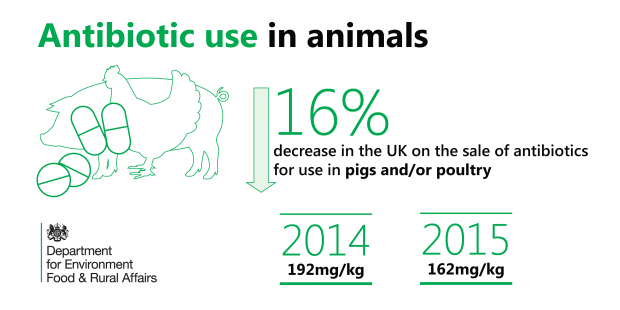
The last year has been eventful. We’ve seen landmark moments in our international effort to tackle antimicrobial resistance (AMR), and Europe has been hit by some challenging animal diseases—most notably the ongoing bird flu outbreak which has swept across the continent. While there are a number of unprecedented challenges on the horizon, I am very optimistic about the important roles for our profession in the future and our ability to maintain our top-class reputation, including for expertise in surveillance and disease control.
Following the UK’s decision to leave the EU, it is now more important than ever to maintain the high standards we have achieved in the UK’s veterinary profession. We will look to our vets to continue the excellent work they do to emphasise the need for good welfare, biosecurity and vigilance to their clients, not only to protect their animals, but also the reputation of the UK itself.
Our strong track record on animal welfare stretches back centuries, and the high standards we hold – reflected by the joint-highest score on the World Animal Protection Index – are a a key part of our British food brand and our farmers’ offer to consumers. As a nation, we hold our animals’ welfare in high regard, and the UK has led the way to raise the bar, for example improving farm animal welfare by, sow stalls and veal crates, and most recently banning battery cages for laying hens. Our vets are crucial to maintaining and improving the welfare of all kept animals, both farmed and companion.
Dealing with the threat of exotic diseases
We are at constant threat from diseases exotic to the UK that can enter by a range of pathways, from smuggled animals or products to uncontrollable movements of wild birds or insect vectors. The UK has a strong track record of containing exotic disease when incursions do happen. This winter’s avian flu outbreak has tested our approach to disease control but, thanks in large part to the hard work and cooperation of vets and poultry keepers to identify early signs of disease and maintain good biosecurity, we have successfully kept disease spread to a minimum, particularly compared to other parts of Europe. As with any outbreak, we can always learn from our experiences and improve our response—and it is important to keep questioning how we could do better next time.
Bluetongue virus (BTV-8) affected livestock across Europe last summer, but didn’t reach the UK. As the weather warms up this year, though, we must remain prepared as the risk increases again. Surveillance is being carried out in the UK both in midges and in sentinel cattle. The impact of the disease in France appears low, but this may be different in previously unexposed animals in the UK. Farmers who think their herd could be at risk in the coming months, especially if they are particularly high value, should talk to their vet about vaccination.
Lumpy skin disease has never been present in the UK, but Europe has been challenged and shaken by a number of outbreaks of a disease which was previously unprecedented outside of Africa. It is an additional threat which we must monitor closely and be prepared for should it reach our shores.
The fight against AMR
Constantly working to improve the health of our animals will not only help to improve productivity and returns to farm businesses, along with the potential for exports, but will also help to reduce the need for antibiotics. The issue of AMR was the focus for this year’s World Vet Day in April, and one that remains high on the global agenda. As vets, you are likely to find yourselves on the frontline of this fight.
2016 felt like a breakthrough year in our international efforts to tackle the growing problem of AMR. Lord O’Neill published his eagerly-awaited report on the topic, and the UK Government adopted his suggested ambitious targets to reduce antibiotic use in human and animal health. The UK took a leading role to secure a historic agreement at the UN General Assembly, with all 193 countries agreeing the need for action on antibiotic resistance.

Most importantly, we saw real progress across the industry in implementing new practices to reduce the need for antibiotics. Defra’s latest report of sales of veterinary medicines showed sales of antibiotics for use in food-producing animals dropped 10% between 2014 and 2015, continuing a ten-year downward trend and putting the UK well on track to meet Lord O’Neill’s target of 50mg/kg by the end of 2018. I am really pleased that, with the support of RUMA, our livestock sectors and their veterinary advisers have taken up the challenge of reducing antibiotic use further by making tailored improvements to management and disease control practices.
But we must not rest on our laurels. There is still a lot to do and we have to keep pushing to ensure antibiotics are used responsibly and remain effective for future generations. We need to make progress on diagnostics, vaccines and management practices and better understand and mitigate risks from the environment. Science has an important role to play. A world in which antibiotics are no longer an effective treatment option for people or animals is something we cannot allow to happen. Experts believe that left unchecked, AMR could be directly responsible for 50 million deaths per year and cost the global economy $100trillion by 2050. So the need for continued action, with the veterinary and medical professions working together in a One Health approach, is clear.
The opportunities ahead
The UK’s vets—both Official Veterinarians and those in the private sector—play a key role in protecting our country from endemic and exotic diseases, tackling outbreaks when they occur, safeguarding our animals and tackling global challenges like antibiotic resistance. Without your great work, we could not achieve our aims on animal welfare and would be in a poorer position to spot upcoming disease threats. It is absolutely vital that as we move towards a new relationship with Europe and the rest of the world, we maintain and enhance our capabilities at home and continue to work with partners abroad. The Government’s commitment to high standards of animal health and welfare, coupled with the need to respond to the challenges and opportunities of leaving the EU, open up the possibility for a new strategic approach to securing good animal health and welfare and the benefits that will bring. The veterinary profession has an opportunity to help shape that future working with both animal keepers and the Government.
Originally published in Vet Record, 5 August 2017. Republished with kind permission
Follow Nigel on Twitter @ChiefVetUK
